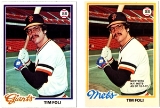
1970s O-Pee-Chee
Encyclopedia
In the 1970s, O-Pee-Chee
produced a licensed version of the American Topps sets
throughout the decade.
The Canadian
printed
O-Pee-Chee cards tended to be printed on lighter grey cardstock and often included traded lines on the front of the cards. In 1970, due to Canadian law, the cards were modified to include both French and English text in which case T.C.G was replaced by O.P.C. in the copyright line. The first four series of the 1971 set(1-523) featured French and English card backs, while the 5th and 6th series reverted to the English-only back of their Topps counterpart. The 1971 set also had several cards unique to the Canadian issue, including cards with trade lines on the front, and extra Expo player cards that resulted in the O Pee Chee set substituting Ron Hunt for Topps' #161 Coin Checklist,Claude Raymond for Topps' #202 Reds Celebrate, and Rusty Staub for Topps' White Sox Team Card. In 1977 different photos were used on some of the cards. Other variations include yellow backs in 1971 and 1974 rather than green used by Topps. From 1973 until 1975, the amount of cards in both the Topps and O-Pee-Chee sets were identical in size.
O-Pee-Chee
The O-Pee-Chee Company, Ltd. was a 20th-century Canadian confectionery company that produced candy until the mid 1990s. The company, based in London, Ontario, was originally owned by the McDermid family . The company was later owned by Frank Leahy and then, sold to his son in law, Gary Koreen...
produced a licensed version of the American Topps sets
1970s Topps
The 1970s saw Topps go largely uncontested in the sports card market. The decade featured full runs of baseball, football, basketball, and hockey. Aside from issues like Kellogg's cereal premiums which ran throughout the 70s there was not much in the way of major national card manufacturers to...
throughout the decade.
The Canadian
Canada
Canada is a North American country consisting of ten provinces and three territories. Located in the northern part of the continent, it extends from the Atlantic Ocean in the east to the Pacific Ocean in the west, and northward into the Arctic Ocean...
printed
Offset printing
Offset printing is a commonly used printing technique in which the inked image is transferred from a plate to a rubber blanket, then to the printing surface...
O-Pee-Chee cards tended to be printed on lighter grey cardstock and often included traded lines on the front of the cards. In 1970, due to Canadian law, the cards were modified to include both French and English text in which case T.C.G was replaced by O.P.C. in the copyright line. The first four series of the 1971 set(1-523) featured French and English card backs, while the 5th and 6th series reverted to the English-only back of their Topps counterpart. The 1971 set also had several cards unique to the Canadian issue, including cards with trade lines on the front, and extra Expo player cards that resulted in the O Pee Chee set substituting Ron Hunt for Topps' #161 Coin Checklist,Claude Raymond for Topps' #202 Reds Celebrate, and Rusty Staub for Topps' White Sox Team Card. In 1977 different photos were used on some of the cards. Other variations include yellow backs in 1971 and 1974 rather than green used by Topps. From 1973 until 1975, the amount of cards in both the Topps and O-Pee-Chee sets were identical in size.
Baseball
| Year | Set | Set Type | Description | Cards in Set | Size |
|---|---|---|---|---|---|
| 1970 | Base Set | Base | 546 | 2.5 × 3.5 inches | |
| 1971 | Base Set | Base | 752 | 2.5 × 3.5 inches | |
| 1972 | Base Set | Base | 525 | 2.5 × 3.5 inches | |
| 1973 | Base Set | Base | 660 | 2.5 × 3.5 inches | |
| Blue Team Checklists | Insert | 24 | 2.5 × 3.5 inches | ||
| 1974 | Base Set | Base | 660 | 2.5 × 3.5 inches | |
| Red Team Checklists | Insert | 24 | 2.5 × 3.5 inches | ||
| 1975 | Base Set | Base | 660 | 2.5 × 3.5 inches | |
| 1976 | Base Set | Base | 660 | 2.5 × 3.5 inches | |
| 1977 | Base Set | Base | 264 | 2.5 × 3.5 inches | |
| 1978 | Base Set | Base | 242 | 2.5 × 3.5 inches | |
| 1979 | Base Set | Base | 264 | 2.5 × 3.5 inches | |
Football
Standard size is 2½ × 3½ in.- 1970 O-Pee-Chee CFL 115 cards standard size similar to 1969 Topps NFL
- 1970 O-Pee-Chee CFL Push-Out Inserts 16 cards standard size
- 1971 O-Pee-Chee CFL 132 cards standard size
- 1971 O-Pee-Chee CFL Poster Inserts 16 cards Size:5X7
- 1972 O-Pee-Chee CFL 132 cards standard size
- 1972 O-Pee-Chee CFL Trio Sticker Inserts 24 cards

